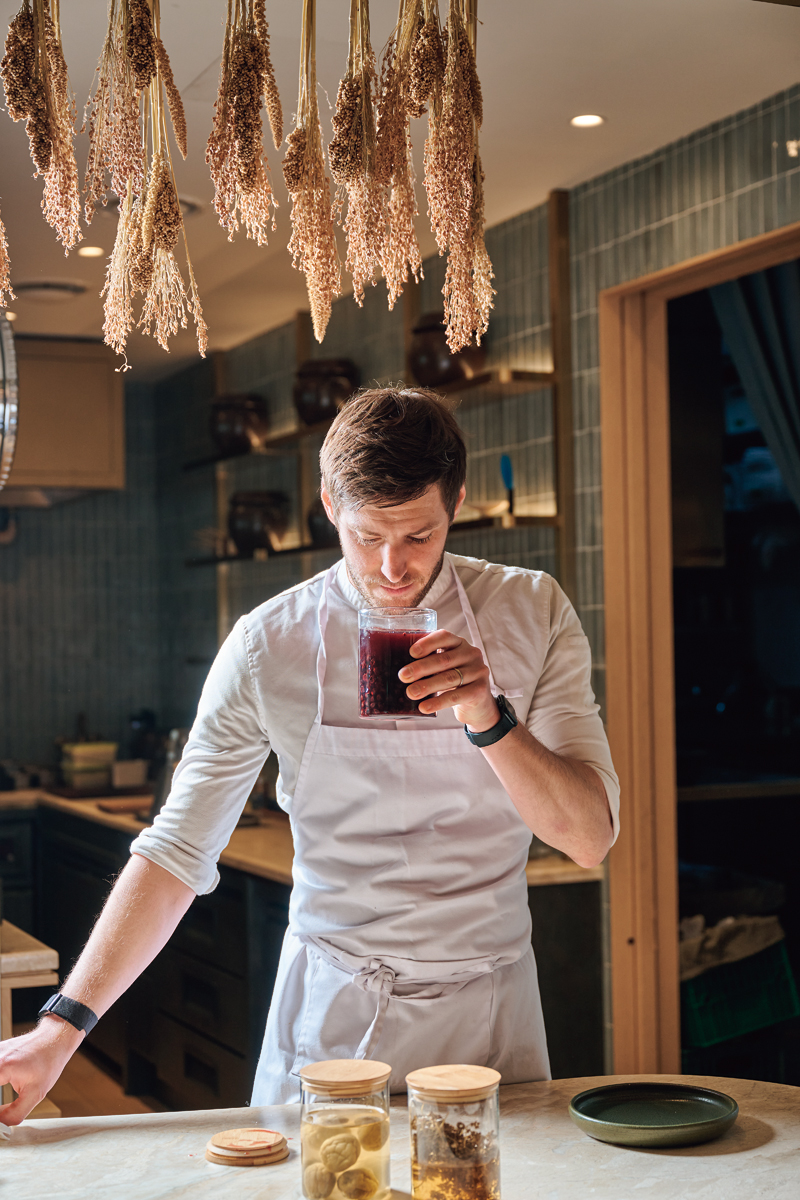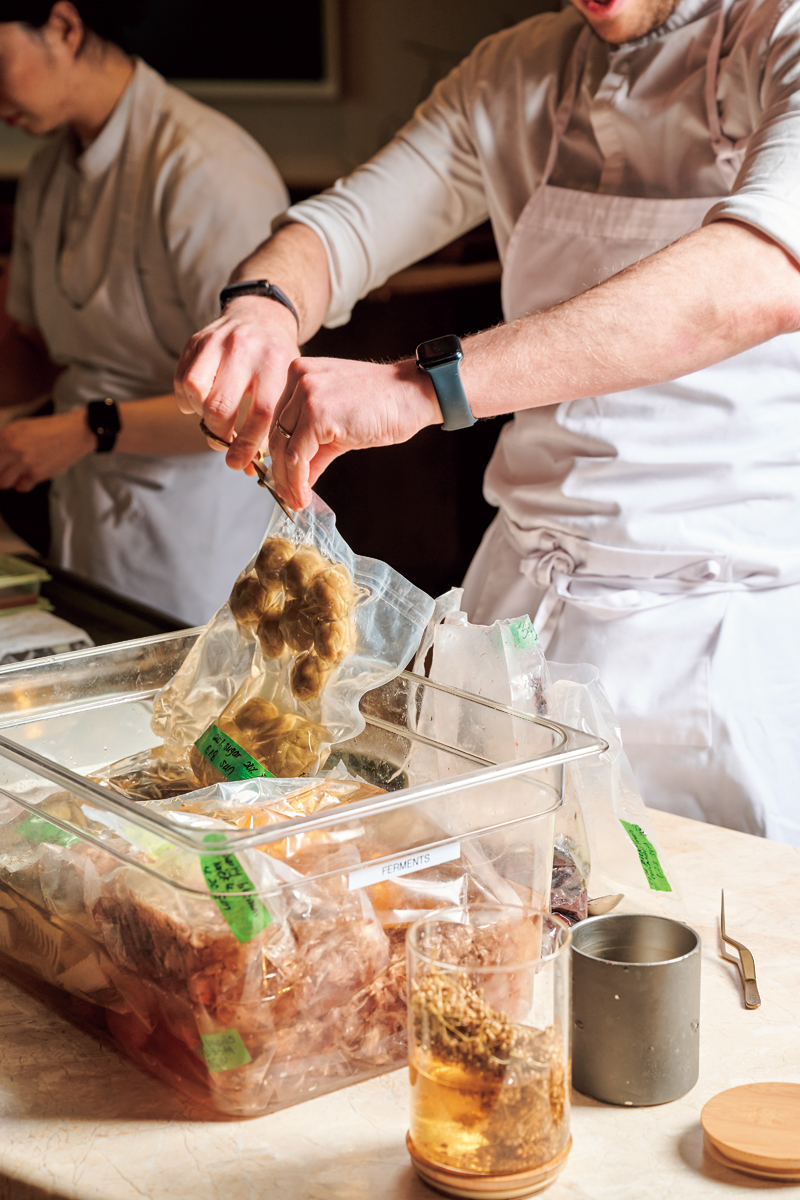Chef Joseph Lidgerwood loves Korean ingredients. His award-winning restaurant strives to memorable experiences that redefine the possibilities of a Korean menu.

Joseph Lidgerwood’s appreciation of the character and freshness of Korean food led him to open EVETT, a restaurant where he serves a tasting menu made with local ingredients. Some of them come from his forays into the mountains and countryside.
After 14 months of living out of a suitcase with no stable income or routine, Joseph Lidgerwood sat down on the shore of Jeju Island trying to glean information from one of the haenyeo, the island’s famous female divers who harvest seafood without using air tanks.
“Every time I asked a question, she shoved seongge [sea urchin] into my mouth. So, I just sat there and ate with her. It was such a nice moment, seeing the divers come up out of the water, wetsuits on, jumping on their scooters and driving off,” he fondly recalls.
Growing up on the Australian island of Tasmania, Lidgerwood enjoyed trips with his family, catching seafood and bringing it home to fill the freezer. Nevertheless, his diet mainly consisted of meat, cooked vegetables, and mashed potatoes. “You’d go out for dinner and pay a tenner [US $5–6] for a pub meal. That was the ultimate ‘fine dining experience’ for me at the time.”
FROM BURGER FLIPPER TO ABLE CHEF
By Lidgerwood’s teenage years, he had begun helping his mother cook. He decided to take advantage of Australian government incentives to promote trade, but instead of hoping to become an electrician or mechanic like his friends, he thought being a chef “sounded cool.”
His first job was flipping hamburgers at a so-called gourmet café in the river town of Franklin. He then worked at a steakhouse, which he describes as a step up, even though they mainly served fare such as “steak with blue cheese stuck in the middle.” His next career move was life-changing; one of the steakhouse’s chefs who had recently returned from the UK told him that working in a high-end restaurant there had been “hellish but highly rewarding.” That was enough to convince Lidgerwood to move to London.
His first jobs there involved French cuisine and included working at The Square, a Michelin two-star restaurant co-owned by internationally renowned chef Philip Howard. The Ledbury, another iconic London restaurant co-owned by Howard, was his next stop.
“They were crazy kitchens. It took me a longtime to settle in, working on four hours’ sleep. Some people would resign after a month. They wouldn’t just leave the restaurant — they’d leave cooking altogether.”
Still, Lidgerwood, 36, credits his experience at these restaurants for his drive, commitment, and intensity. “Without that, I would never be this motivated. The experience was incredible but not sustainable long-term. I don’t use any of those recipes anymore. What you really learn is how to better manage your day. How to be a competent chef — clean, tidy, organized, fast, precise.”
ONE STAR HOUSE PARTY
In 2016, Lidgerwood joined a friend who was planning to launch unconventional private dining events. Together, they established One Star House Party, a globe-trotting pop-up dining experience. With their relatively simple dishes, often including just three or four elements, they weren’t aiming for the gastronomic stratosphere, but the inimitable experience they offered quickly d a cult following. Every event sold out.
Among the eccentric locations they catered were Mt. Everest Base Camp, where guests assembled from around the world, and a sleeper train in Viet Nam, with passengers eating a four-course meal on their bunk beds.
FIRST TIME IN KOREA
A visit to Jeju Island before a dining event in Seoul was one of Lidgerwood’s first experiences in Korea. He and his friends wanted to free dive for shellfish with haenyeo but were rebuffed because the divers thought taking them along would slow them down. So, Lidgerwood ended up on the beach trying to gather information that would help promote his upcoming event. When he attempted to ask about the divers’ lifestyle or Korean ingredients, he ended up with mouthfuls of sea urchin.
Shortly after, Lidgerwood left One Star House Party and went to the US. Then, a customer from the pop-up event in Korea offered a space in his new building in Seoul. In 2019, with the support of his wife Ginny, Lidgerwood opened Restaurant EVETT. At a time when most of Korea’s fine dining scene relied heavily on luxurious ingredients such as foie gras and caviar, the new restaurant presented something slightly off-kilter: a menu by an Aussie chef–owner centered around Korean ingredients.

The use of ingredients previously unknown even to many Koreans, as well as a strong focus on fermentation, earned EVETT a star in the Michelin Guide within a year of its opening.
“ Our food is definitely not fusion. Maybe it’s ‘innovative Korean?’ What it represents is an acknowledgement of the amazing [local] produce, how the ingredients are eaten here, and then showcasing them in a different way,” he explains.
Lidgerwood pays homage to the role of fermentation in Korean food. Also important is foraging, an activity he regularly enjoys, and dubs “stealing from the mountains.”
Expressing his fondness for uniquely Korean ingredients, he expounds, “The way they are used, the way the food is cooked, and the flavors that are ed up — you just know you’re in Korea. It’s so dynamic. And it cannot really be done anywhere else. The way ganjang gyejang [soy sauce marinated raw crab] is made, you could not do that legally in Australia. And makgeolli [a fermented rice-based alcohol] doesn’t really travel well. These gems are locked inside Korea, and when you try to franchise something or over-sanitize it, you lose the magic. They’d technically be Korean dishes but not true Korean food.”
Some of Lidgerwood’s recent dishes include quince dongchimi, a type of kimchi in a water-based pickling liquid that he makes using meongge, or sea pineapple; Jeju Island tangerine; goat’s milk; and Angelica root. He describes this as one of his favorite flavor combinations.
LIKE A FAMILY
EVETT has nine tables and can serve some 25 people at a time. It exclusively offers a multi-course tasting menu with, as Lidgerwood adds, “a few signatures sprinkled in for good measure.” The restaurant’s 15 chefs regularly explain and finish preparing dishes at the table. Lidgerwood believes the intricate and exquisitely refined food represents his team’s constant “wrestling with how far we can push ourselves and our menu.”
Initially, he was wary about being a foreigner serving Korean food, but since its opening, his restaurant has received acclaim from critics and customers alike. “The overwhelming response has been people being super grateful that we love Korean ingredients. That’s so motivating. Our food hasn’t always been mind-blowing or amazing, but our customers are really appreciative of it.”
Having received multiple awards and accolades, including a Michelin star in 2020, the restaurant is at the pinnacle of Korea’s ever-growing elevated culinary scene. After remodeling the restaurant and, more recently, moving to a larger site in Gangnam’s affluent Apgujeong neighborhood, Lidgerwood was disappointed to not have been awarded a second star this year, but he doesn’t define his or the restaurant’s success by the Michelin rating.
“ I couldn’t be happier with the restaurant and where we’re going. We have amazing guests and I love the food. I get to travel around and find new ingredients.”
Even with a trove of positive reviews lauding his elevated Korean cooking, sometimes it is the understated comments critics offer that mean the most. One such critic noted that dining at EVETT makes one feel like family.

One of EVETT’s signature dishes: meju, fermented soybean donuts, filled with caramelized cream and topped with black garlic, anchovy, and sorghum rice cake.
© EVETT
A MEMORABLE MEAL
Serving a more than 10-course tasting menu, often accompanied by traditional yet innovative Korean drinks, priced in the hundreds of dollars, generates endless pressure to and deliver. The nagging conundrum is how to ensure a memorable meal.
Every single table and customer should have a special experience. And yet, not everyone wants to know the minutiae of each dish and its ingredients. Lidgerwood recognizes the importance of reading each table to provide guests with an experience they can appreciate and value.
Perhaps the best example of this is the story of the owner of a nearby fried chicken shop who dined at EVETT. Beforehand, Lidgerwood explained the restaurant’s philosophy to him over a few bottles of beer. The chicken vendor struggled to grasp why an Australian fine-dining chef would want to cook almost exclusively with Korean ingredients. After having lunch at EVETT with his wife, he gave a wry smile and remarked that the food “wasn’t terrible.” For Lidgerwood, this assessment was the highest praise. “That has stayed with me the longest. It’s really our fuel to show how amazing Korean ingredients can be.”